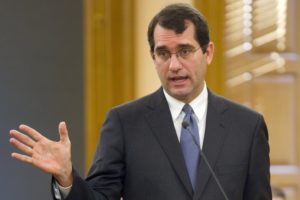 The 2017 Special Committee on a Comprehensive Response to the School Finance Decision (hereinafter referred to as the SCCRSFD) wrapped up their third day of meetings today, ending with a presentation from Kansas Attorney General Derek Schmidt.
The 2017 Special Committee on a Comprehensive Response to the School Finance Decision (hereinafter referred to as the SCCRSFD) wrapped up their third day of meetings today, ending with a presentation from Kansas Attorney General Derek Schmidt.
Schmidt spoke broadly about article VI of the Kansas Constitution and wondered generally about whether or not the Court’s interpretation of that document is congruent with the people’s. “Maybe it is; maybe it isn’t,” said Schmidt. “But maybe we should ask.” Schmidt also wondered whether “adequacy and equity” were the best way to consider what is “suitable.” In his written testimony, Schmidt said “Determining whether a law is ‘equitable’ – i.e., fair to all – is a traditional role of courts. But determining whether an amount of funding is ‘adequate’ is more traditionally a legislative function, not a judicial function.”
Most of today was consumed with constitutional studies, including a report on the history of the education article in the Kansas constitution. The 1861 Wyandotte Constitution had an education article which remained unchanged until 1966 when the legislature proposed the current language which was adopted by voters in the November 1966 general election. It has remained the same since then. But another report to the SCCRSFD noted that since the Montoy decision in 2004, the legislature had proposed 39 statutes and constitutional amendments that would stop school districts from suing or prevent the Court from issuing an enforceable remedy in a school finance lawsuit.
The Committee also looked at what the other 49 state constitutions have to say about education.
Monday was spent in a deep data dive. The Committee studied at-risk funding – how many kids are on free lunch, how many are in at-risk programs, how many are in each district, and what are the criteria used for placement in an at-risk program. They looked at special education, preschool, virtual school, and kindergarten enrollments; and they examined personnel reports.
They studied post-secondary progress, assessment scores, and graduation rates; they counted out-of-state students attending Kansas schools, and they reviewed the fees that had been charged for all-day kindergarten in some districts.
And they kept coming back to “how much?” How much money will they need to put into K-12 education to meet adequacy? If there were anything like the consensus around the room, it would probably be the belief that $600 million is the magic number. It was the only number tossed about repeatedly. Some on the committee seemed to imply that this could not be done due to a belief that it would have to be provided in one year. This was key to Rep. Larry Campbell’s (R-Olathe) repeated questions on whether or not schools could efficiently spend that much money in one year. But on the other side were legislators who promoted a phased-in approach. This was repeatedly brought up by Sen. Anthony Hensley (D-Topeka) who recounted with AG Schmidt the actions they took in 2005 and 2006 in response to the Montoy decision. Back then the Court accepted a three-year phase-in of new funding.
A big part of the funding discussion was focused on how to find $600 million. Fiscal staff presented revenue-raising ideas, showing the committee how much certain taxes would raise if the rates were raised incrementally. And representatives of other agencies (Corrections, Aging & Disability Services, Children & Families, Health & Environment, the Judiciary, and the Board of Regents) provided details on how they would absorb an 18% budget cut which would free up $600 million to be transferred to K-12.
The Committee now will forward their data and findings to the full legislature in the hope that this will jump-start the process when the 2018 session convenes on January 8.
Remember that the Court expects briefs on the solution to be filed by April 30. AG Schmidt and state’s attorney Arthur Chalmers both told the Committee that they needed a solution passed by March 1 to give enough time to prepare for the April 30 deadline. That’s a very tight timeline for a legislature used to stringing things out until the last minute!


